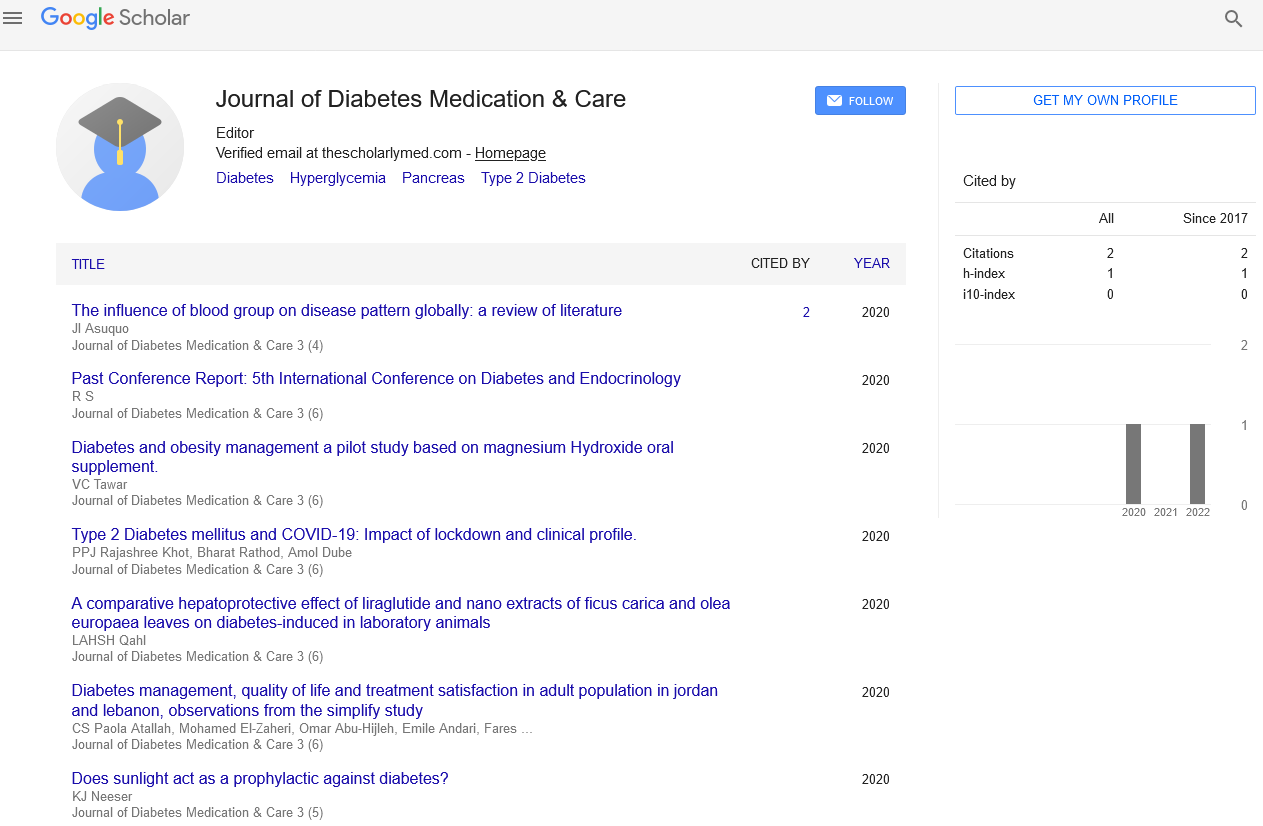Perspective - Journal of Diabetes Medication & Care (2023) Volume 6, Issue 6
Nurturing Mind and Body: The Symbiotic Relationship Between Mental Health and Diabetes Medication Adherence
- Corresponding Author:
- Hiran Tang
Department of Endocrinology, Guangdong Pharmaceutical University, Guangzhou, China
E-mail: hiranawcousia@gmail.com
Received: 02-Nov-2023, Manuscript No. JDMC-23-120958; Editor assigned: 06-Nov-2023, PreQC No. JDMC-23-120958 (PQ); Reviewed: 20-Nov-2023, QC No. JDMC-23-120958; Revised: 27-Nov-2023, Manuscript No. JDMC-23-120958 (R); Published: 05-Dec-2023, DOI: 10.37532/JDMC.2023.6(6).148-149
Introduction
In the intricate tapestry of human health, the threads of mental well-being and physical vitality are tightly woven together. This delicate interplay becomes even more apparent when examining the relationship between mental health and medication adherence in individuals grappling with diabetes. Diabetes, a chronic condition characterized by high blood sugar levels, demands consistent and precise management, often involving medication adherence. However, the intricate dance between mental health and the commitment to medication regimens is a nuanced and often overlooked aspect of diabetes care.
Description
Understanding diabetes and mental health
Diabetes, a condition affecting millions worldwide, comes in two primary forms: Type 1 and type 2. While their etiologies differ, both types necessitate meticulous management to prevent complications. Central to this management is medication adherence-the faithful commitment to prescribed medications, such as insulin or oral hypoglycemic agents. However, the impact of mental health on medication adherence in diabetes cannot be overstated.
The mental health conundrum
Living with diabetes is a perpetual balancing act, and the mental toll can be substantial. The constant monitoring of blood sugar levels, dietary restrictions, and the potential for acute complications can contribute to stress, anxiety, and depression. Moreover, the fear of long-term complications like neuropathy or cardiovascular issues can cast a shadow over an individual’s mental well-being.
The link between mental health and medication adherence
The intricate dance between mental health and medication adherence is a complex phenomenon. Research suggests a bidirectional relationship: Mental health affects medication adherence, and medication adherence can influence mental well-being.
Impact of mental health on medication adherence
Stigma and psychological barriers: Individuals with diabetes may grapple with stigma and societal misconceptions, impacting their mental health. This stigma can lead to psychological barriers, such as denial or avoidance of diabetes management tasks, including medication adherence.
Stress and coping mechanisms: Daily stressors can significantly impact an individual’s ability to adhere to their medication regimen. Some may turn to maladaptive coping mechanisms, such as emotional eating or substance use, further complicating diabetes management.
Depression and apathy: Depression, a common comorbidity in diabetes, can manifest as apathy or a lack of motivation to engage in self-care activities, including medication adherence. The cyclical nature of this relationship can exacerbate both conditions.
Impact of medication adherence on mental health
Psychological benefits of adherence: On the flip side, consistent medication adherence can yield psychological benefits. Achieving stable blood sugar levels can alleviate anxiety associated with unpredictable fluctuations, fostering a sense of control and well-being.
Prevention of complications: Adhering to prescribed medications can also mitigate the risk of diabetes-related complications, reducing the mental burden of anticipating and managing potential health issues.
Strategies for enhancing mental health and medication adherence: Recognizing the symbiotic relationship between mental health and medication adherence is crucial in developing holistic strategies for diabetes care. Here are some practical approaches.
Integrated care: Emphasizing integrated care models that address both physical and mental health can create a comprehensive support system. Collaborative efforts between healthcare providers, mental health professionals, and diabetes educators can bridge the gap.
Education and empowerment: Providing education on the importance of mental health in diabetes care empowers individuals to make informed decisions. Understanding the implications of mental well-being on medication adherence can motivate individuals to prioritize their mental health.
Psychosocial support groups: Establishing psychosocial support groups for individuals with diabetes can create a sense of community. Sharing experiences, challenges, and successes in managing both the physical and mental aspects of diabetes fosters resilience and reduces feelings of isolation.
Cognitive-behavioral interventions: Implementing cognitive behavioral interventions can equip individuals with effective coping mechanisms. Addressing maladaptive thought patterns and fostering positive behavioral changes can improve both mental health and medication adherence.
Personalized treatment plans: Recognizing the individual nature of mental health and medication adherence, tailoring treatment plans to address specific needs is paramount. Personalized care enhances the likelihood of sustained engagement in diabetes management.
Conclusion
In the intricate realm of diabetes care, the symbiotic relationship between mental health and medication adherence plays a pivotal role. Acknowledging and addressing the multifaceted impact of mental well-being on diabetes management is a crucial step toward comprehensive healthcare. By fostering an environment that prioritizes both physical and mental health, we can empower individuals to navigate the complexities of diabetes with resilience, enhancing their overall quality of life. As the healthcare landscape continues to evolve, embracing a holistic approach to diabetes care is not just beneficial-it’s essential.

